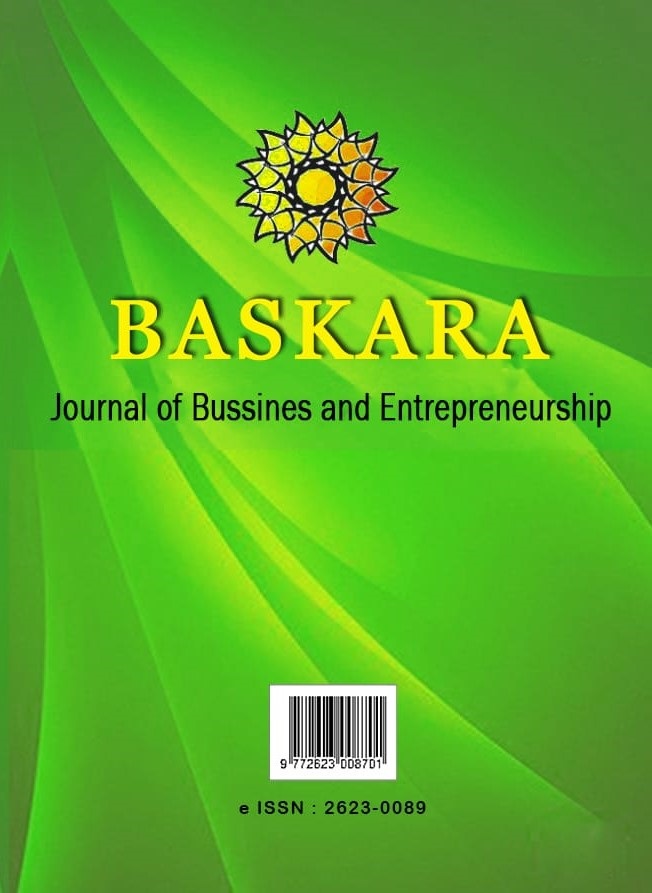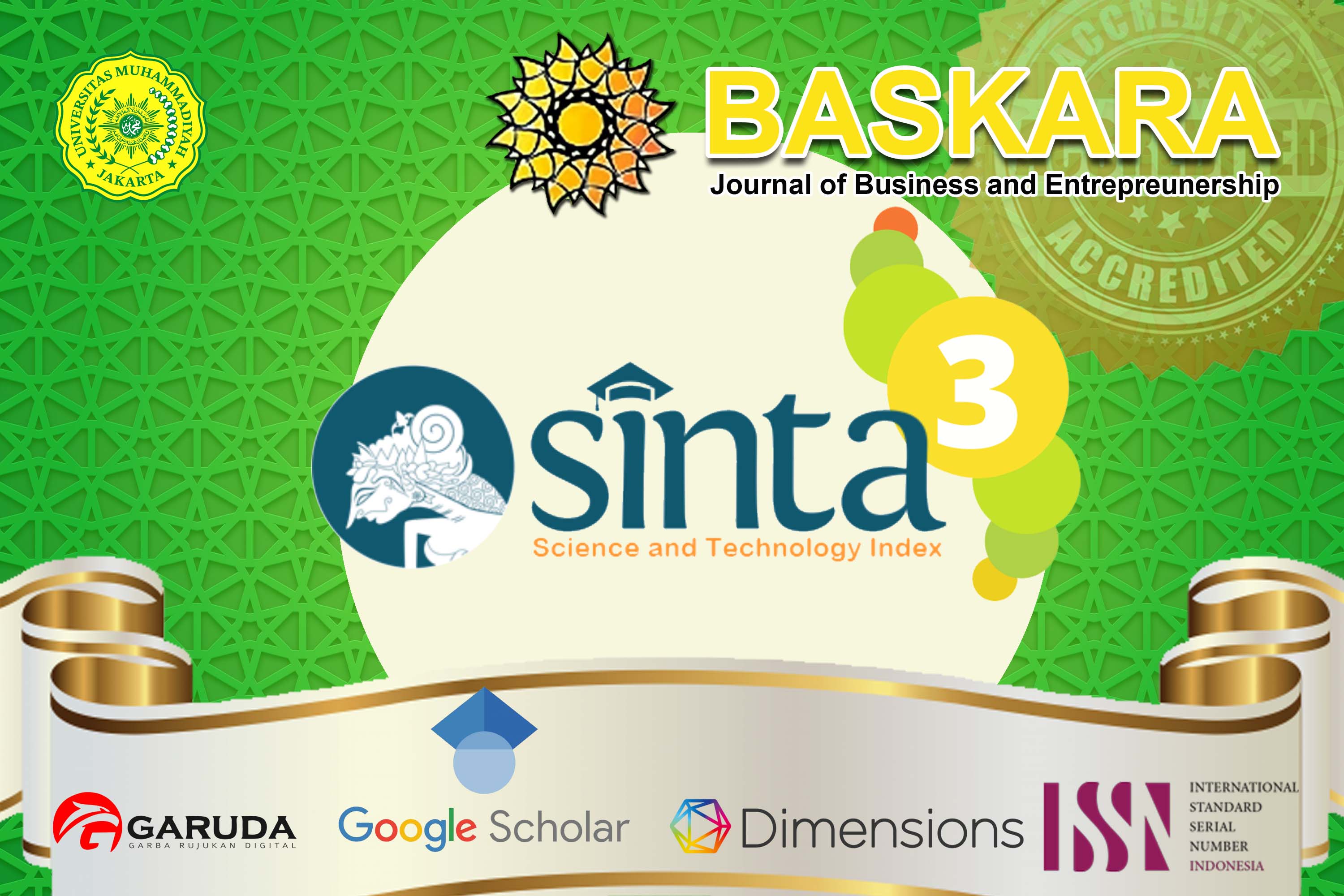Development of Creative Economy Based on Local Wisdom in the Era of Digital Transformation Through Inclusive Education and Village Community Empowerment in Bantul Regency, Yogyakarta
DOI:
https://doi.org/10.54268/baskara.v6i2.21629Keywords:
Creative economy, Local wisdom, Inclusive education, Community empowerment, Digital transformationAbstract
This research aims to examine how inclusive education, community empowerment, and digital transformation contribute to the development of a creative economy based on local wisdom in Indonesia, with a focus on Bantul Regency, Yogyakarta. Inclusive education, which is a primary concern in addressing social inclusion challenges, still shows low participation rates in Indonesia. Meanwhile, the presence of local communities in Indonesia, if supported by local governments and digital transformation, has the potential to open new opportunities in developing the creative economy with the utilization of digital technology to enhance reach and competitiveness. The research methodology employs a case study approach with qualitative methods, allowing for an in-depth understanding of the phenomena under investigation. Data were collected through library research and participant observations and then analyzed thematically. The research findings indicate that collaborative initiatives of local governments with stakeholders to develop locally-based tourism villages and the implementation of inclusive education in schools around these tourism villages have improved social inclusion and empowered the local economy. Active participation from various parties, such as local governments, communities, and social organizations, in managing and promoting tourism destinations has successfully increased collective income and community welfare. Through the adoption of digital technologies such as social media, online marketing, tour guide applications, and data management, tourism villages in Bantul can reach broader markets and enhance their competitiveness. As a result, not only is there an increase in economic welfare for local communities, but also an appreciation for local wisdom and traditional culture.References
Agung, W. C., Kustiyarto, R. A., Anggoro, P. W., Sururi, M., Ananda, S., Wulandari, T. Y., Oktiviana, F. A., Trapsilowati, H. J., & Marhaeni, N. H. (2023). Peningkatan Keterampilan Teknologi Digital Bagi Masyarakat Inklusif di Desa Argosari Melalui Pelatihan Canva. Nanggroe: Jurnal Pengabdian Cendikia, 2(7).
Arifin, P., & Ardhiansyah, N. N. (2020). Application of Sustainable Development Communication in Local Wisdom-Based Tourism Village Management in Yogyakarta. Jurnal Nomosleca, 6(1).
Asiah, A. (2019). Implementasi Pendidikan Inklusi dalam Mengembangkan Karakter Cinta Tanah Air di TK Laboratory Pedagogia Bantul Yogyakarta. Annual Conference on Islamic Early Childhood Education (ACIECE), 4, 147–156.
Braun, V., & Clarke, V. (2006). Using thematic analysis in psychology. Qualitative Research in Psychology, 3(2), 77–101.
Florida, R. (2002). The rise of the creative class (Vol. 9). Basic books New York.
Hanjarwati, A., Suprihatiningrum, J., & Aminah, S. (2019). Perceptions of people with disabilities and stakeholders to promote and develop inclusive communities in DIY and Southeast Asia. Jurnal Sosiologi Reflektif, 13(2), 379–404.
Howkins, J. (2002). The creative economy: How people make money from ideas. Penguin UK.
Kriska, M., Andiani, R., & Simbolon, T. G. Y. (2019). Community participation in community based tourism in the Puton Watu Nglak tourist village, Bantul district. JSEP (Journal of Social and Agricultural Economics), 12(1), 11–18.
Mellander, C., & Florida, R. (2021). The rise of skills: Human capital, the creative class, and regional development. Handbook of Regional Science, 707–719.
on Environment, W. C., Development, & Brundtland, G. H. (1987). Opening Address by Gro Harlem Brundtland... on the Occasion of the Launch of the Report" Our Common Future", London, England, 27 April 1987. World Commission on Environment and Development.
Rudiatin, E. (2023). The Culture Policy for MSME in Digital and Their Prospects. BASKARA: Journal of Business and Entrepreneurship, 6(1).
Saptarini, A., Ms, M., Ahadiat, A., & Bangsawan, S. (2023). Implementation of Digital Entrepreneurs in Determining Tourism Village in Indonesia (Systematic Literature Review). BASKARA: Journal of Business and Entrepreneurship, 6(1).
Surwanti, A., & Supriyono, E. (2020). Partisipasi Masyarakat dalam Pembangunan Dusun yang Inklusif. Prosiding Seminar Nasional Program Pengabdian Masyarakat.
Tarakanita, D., Yulitasari, P. A., Ismawati, S., & Rinaldhi, E. A. (2017). The Role of the Cultural Corner Community in Preserving Local Culture Through Cultural Tourism in Bantul. Jurnal Penelitian Humaniora, 22(1), 45–56.
Tedjakusuma, A. P., Retha, N. K. M. D., & Andajani, E. (2023). The Effect of Destination Image and Perceived Value on Tourist Satisfaction and Tourist Loyalty of Bedugul Botanical Garden, Bali. BASKARA: Journal of Business and Entrepreneurship, 6(1).
Wartomo, W. (n.d.). Implementation of the inclusive education model in regional schools in Yogyakarta. Mukaddimah: Jurnal Studi Islam, 1(1), 197–220.
Yuliani, E., Yusuf, A., & Armini, N. K. A. (2020). The Relationship of Positive Emotions with the Cancer Patients Quality of Life in Halfway House. Jurnal Ilmu Keperawatan Jiwa, 3(4), 421–430.
Downloads
Published
Issue
Section
License
In order for Baskara: Journal of Business and Entrepreneurship to publish and disseminate research articles, we need publishing rights (transfered from author(s) to publisher). This is determined by a publishing agreement between the Author(s) and Baskara Journal. This agreement deals with the transfer or license of the copyright of publishing to Baskara: Journal of Business and Entrepreneurship, while Authors still retain significant rights to use and share their own published articles. Baskara : Journal of Business and Entrepreneurship supports the need for authors to share, disseminate and maximize the impact of their research and these rights, in any databases.
As a journal Author, you have rights for a large range of uses of your article, including use by your employing institute or company. These Author rights can be exercised without the need to obtain specific permission. Authors publishing in Baskara : Journal of Business and Entrepreneurship have wide rights to use their works for teaching and scholarly purposes without needing to seek permission, including:
- use for classroom teaching by Author or Author's institution and presentation at a meeting or conference and distributing copies to attendees;
- use for internal training by author's company;
- distribution to colleagues for their reseearch use;
- use in a subsequent compilation of the author's works;
- inclusion in a thesis or dissertation;
- reuse of portions or extracts from the article in other works (with full acknowledgement of final article);
- preparation of derivative works (other than commercial purposes) (with full acknowledgement of final article);
- voluntary posting on open web sites operated by author or author’s institution for scholarly purposes.
Copyright Transfer Agreement for Publishing (Publishing Right)
The Authors who submit manuscript has to understand that if accepted for publication, mean that all copyright and publishing right of the article shall be assigned/transferred to Baskara: Journal of Business and Entrepreneurship as assigned publisher.
- CC BY-NC: This license allows reusers to distribute, remix, adapt, and build upon the material in any medium or format for noncommercial purposes only, and only so long as attribution is given to the creator.
It includes the following elements:
BY ![]() – Credit must be given to the creator
– Credit must be given to the creator
NC ![]() – Only noncommercial uses of the work are permitted
– Only noncommercial uses of the work are permitted
Baskara (C) Copyright (2022):
BASKARA: Journal of Business and Entrepreneurship by https://jurnal.umj.ac.id/index.php/baskara
is licensed under a Creative Commons Attribution-NonCommercial 4.0 International License








